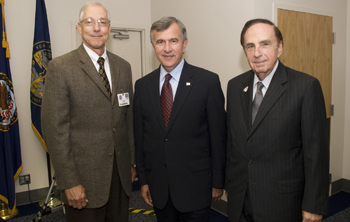 |
From left: Al Washko, director, VA Nebraska-Western Iowa Health Care System, U.S. Sen. Mike Johanns and UNMC Chancellor Harold M. Maurer, M.D., at a field hearing last week about the physical condition of the Omaha VA Medical Center. Dr. Maurer testified about the VA’s importance to UNMC’s educational mission. (Photo by John Muir) |
Johanns chaired the Senate Committee on Veterans Affairs hearing on Thursday at the Omaha facility to discuss the aging complex’s needs and the cost to meet them.
|
“The Omaha VA was built in the 1950s and is physically very limiting,” he said. “Our ability to serve the veterans to their best advantage is compromised. A new facility would be transformational with regard to quality of care for veterans, our opportunity to educate students and resident physicians in the latest advances, carrying out cutting edge patient care and exploring new areas for funded research.”
The hearing followed the release of a VA-commissioned feasibility study that was completed in April 2009 that identified the Omaha VAMC’s infrastructure needs and identifies several options to either renovate or replace the 58-year-old facility.
Omaha’s VA medical center faces myriad challenges including:
- An aging heating, ventilation and air conditioning system;
- Corroding water pipes; and
- Severe space deficiency.
The study released to Nebraska congressional members Aug. 17 estimates that it would require more than $500 million to renovate or replace the medical center.
“We must seize the opportunity now to do everything we can to support the veterans while we have the attention of Veterans Affairs in Washington,” Dr. Maurer said.
Although the VA study found that major infrastructure work will be needed on the facility, veterans can rest assured they will continue to receive high-quality care in a safe environment, said Donald Orndoff, director of the VA Office of Construction and Facilities Management.
Johanns heard from others including:
- Al Washko, director, VA Nebraska-Western Iowa Health Care System;
- Rowen Zetterman, M.D., dean of the Creighton University School of Medicine;
- Thomas Lynch, M.D., professor of surgery at UNMC and acting Chief of Staff at the Omaha VA Medical Center; and
- Bob Yager, facilities chief at the VA medical center.
Dr. Lynch assured the senator that despite the deficiencies at the medical center, conditions have not affected patient care, yet.
Although the medical staff provides high-quality health care in Omaha to veterans, Dr. Lynch said the real concern is “how long we can use and modify this space and still deliver state-of-the-art care.”
Although he sees no quick solution to the center’s issues, Johanns said he supports efforts to improve conditions at Omaha VAMC.
“We are not going to get a major construction project approved overnight,” he said. He emphasized, however, that “I would argue that this investment is a wise investment for our veterans.”